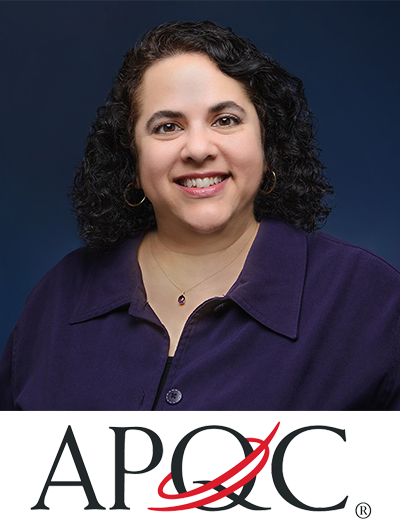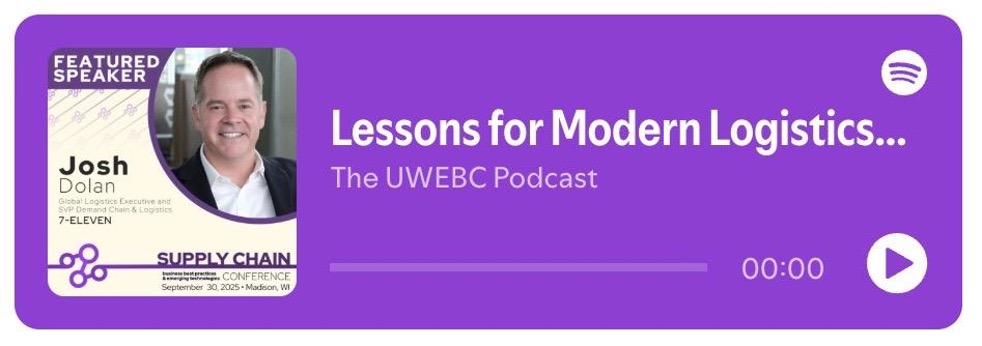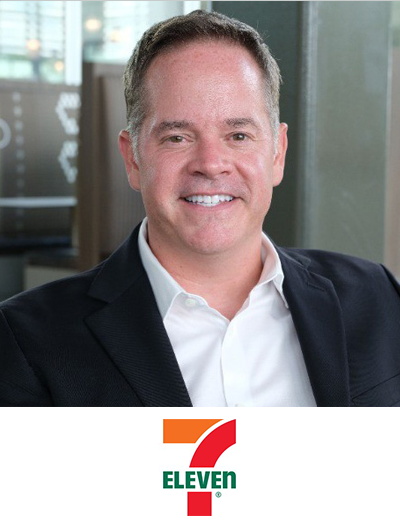Track Speakers
Research Insights for 2025 and Beyond
Marisa Brown, Senior Principal Research Lead, American Productivity & Quality Center (APQC)

The audio summary of this session was autogenerated by Google’s NotebookLM.
Find more audio summaries and content on the UWEBC Podcast on Spotify
Enjoy a highlight clip from this session:
 Research Insights for 2025 and Beyond
Research Insights for 2025 and Beyond
Marisa Brown, Senior Principal Research Lead, American Productivity & Quality Center (APQC)
Supply chain leaders are constantly urged to build “resilient” and “agile” operations—but what do these terms truly mean in practice? Where are the most common gaps, and how are companies investing their time and resources to close them?
Marisa Brown, Senior Principal Research Lead at APQC, brings over 25 years of experience in researching and benchmarking these challenges. She will share her latest findings with our participants.
This session is an ideal kickoff for our supply chain track! Marisa will present compelling data and benchmarking examples on building resilient and agile supply chains, along with new research on talent upskilling and cross-functional collaboration. Her emphasis on data storytelling will help translate insights into actionable strategies.
Key session takeaways:
- Common pitfalls in achieving supply chain resilience—and where companies are focusing their improvement efforts.
- Why having a “Plan B” isn’t enough—and how a contingency playbook offers a better path forward.
 Marisa Brown
Marisa Brown
Senior Principal Research Lead
American Productivity & Quality Center (APQC)
Marisa Brown is a leader in supply chain with more than 25 years of experience in business, research, writing, speaking, and consulting. Currently, she develops and oversees the APQC supply chain management and product development research agenda, and conducts research on current trends and their impact on outcomes across the supply chain. She has written more than two dozen popular APQC research reports, and is a frequent media contributor for publications including Supply Chain Management Review, Supply and Demand Chain Executive, and many others. Marisa has been selected as a recipient of the Women in Supply Chain and Supply Chain Pros to Know awards.
Developing Leaders Who Grow a Winning Culture
Steve Jones, Partner at Jadin | Jones; Co-author of The Twin Thieves

The audio summary of this session was autogenerated by Google’s NotebookLM.
Find more audio summaries and content on the UWEBC Podcast on Spotify
Enjoy a highlight clip from this session:
 Developing Leaders Who Grow a Winning Culture
Developing Leaders Who Grow a Winning Culture
Steve Jones, Partner at Jadin | Jones; Co-author of The Twin Thieves
Culture either happens by design or default. Steve Jones will be discussing how to intentionally create and grow a “winning” culture by developing leaders within your organization. Steve will break down the power of connection, mindset, trust, and servant leadership into actionable steps that you can take immediately with your team.
Key session takeaways:
- Connected teams are powerful teams. Elite leaders intentionally build connected teams.
- Culture is dynamic – it is either growing or it is dying, it is getting better or it is getting worse. The best way to grow your culture is by developing your leaders.
- Perspective drives performance. How you view things is how you do things.
 Steve Jones
Steve Jones
Partner at Jadin | Jones
Co-author of The Twin Thieves
Steve Jones is a professional leadership coach, keynote speaker, and best-selling author who teaches leaders to empower themselves and others, and create cultures of strength, unity, and resiliency. Steve’s positive impact developed as a teacher and head football coach at Kimberly High School, where throughout 11 seasons he led his teams to a record of 129-9 (including 70 consecutive wins) and five state championships. Steve’s winning formula is now captivating Fortune 500 companies, professional sports organizations, and competitive leaders looking to inspire successful teams.
Steve is the Co-founder of Jadin-Jones Coaching and Consulting, focusing on leadership, culture, and mindset. He has been commissioned by numerous leading organizations, including Verizon, Kimberly-Clark, and Mutual of Omaha. Steve is the co-author of bestselling book The Twin Thieves and is currently a consultant for the Green Bay Packers.
Steve Jones shares dynamic stories, helpful tools and practical principles on how to intentionally create and grow a winning culture by developing elite leaders within your organization.
Lessons for Modern Logistics Leaders and Anyone Seeking Stronger Supplier Relationships
Josh Dolan, Global Logistics Executive and SVP Demand Chain & Logistics, 7-Eleven

The audio summary of this session was autogenerated by Google’s NotebookLM.
Find more audio summaries and content on the UWEBC Podcast on Spotify
Enjoy a highlight clip from this session:
 Lessons for Modern Logistics Leaders and Anyone Seeking Stronger Supplier Relationships
Lessons for Modern Logistics Leaders and Anyone Seeking Stronger Supplier Relationships
Josh Dolan, Global Logistics Executive and SVP Demand Chain & Logistics, 7-Eleven
What does it mean to be a customer-focused logistics leader? Given the evolution of global logistics – especially in recent years – what skills are needed to lead a modern logistics organization, and how do you leverage supplier partnerships to help you achieve results?
Josh Dolan is a global logistics executive who has worked for great brands like Dicks Sporting Goods, Target, Amazon, and now 7-Eleven. He will share how the global logistics ecosystem has evolved in recent years, how remaining customer-focused and agile helps drive results, and the leadership lessons he has learned on how to be a good supplier partner.
Key session takeaways:
- How has global logistics evolved in recent years, and what skills are needed for the modern-day logistics leader?
- What are the keys to successful supplier relationships, and how can you build stronger supply chain partnerships?
 Josh Dolan
Josh Dolan
Global Logistics Executive and SVP Demand Chain & Logistics
7-Eleven
Josh Dolan is a senior supply chain and operations leader with deep expertise in the global supply chain across retail, technology, and life sciences industries. Josh was most recently President of Consumer, Americas and Asia-Pacific at GXO Logistics. He has also served in senior supply chain and/or logistics roles at Cardinal Health, Amazon Global Logistics, Target Corporation, and Dick’s Sporting Goods. Known for creating customer-driven supply chains through an agile mindset, Josh is a passionate leader focused on delivering on brand commitment.
Agentic AI in Supply Chain: Practical Reality vs. Hype
Eric M. Topp, Corporate SVP & Practice Leader – Shipping & Logistics, WNS

The audio summary of this session was autogenerated by Google’s NotebookLM.
Find more audio summaries and content on the UWEBC Podcast on Spotify
Enjoy a highlight clip from this session:
 Agentic AI in Supply Chain: Practical Reality vs. Hype
Agentic AI in Supply Chain: Practical Reality vs. Hype
Eric M. Topp, Corporate SVP & Practice Leader – Shipping & Logistics, WNS
Agentic AI is quickly becoming the focal point for many technology companies, with rapid market shifts creating both excitement and uncertainty. But what does this mean for supply chains today—and what practical applications are emerging now versus those still on the horizon?
Eric Topp, a seasoned executive with over 30 years in Supply Chain, Transportation & Logistics (SCT&L), will cut through the hype to share actionable insights. Before joining WNS, Eric led Worldwide Solution Development and Business Development for SCT&L at Amazon Web Services, with a strong emphasis on agentic AI. Drawing on that experience, he will highlight real-world use cases already delivering value and provide participants with a practical guide on how to prepare their organizations to successfully leverage this transformative technology.
Key session takeaways:
- What are some practical applications of Agentic AI, both at the tactical/operational level in supply chain as well as the strategic/enterprise level?
- What can I do to be “Agentic AI ready”, both as a leader, and in leading my organization?
- What are the correct steps to proceed and what do I need to do to be “ready”?
 Eric M. Topp
Eric M. Topp
Corporate SVP & Practice Leader – Shipping & Logistics
WNS
Eric M. Topp has over 30 years of experience in the Transportation and Logistics space leading Operations, IT, Transformations, and Sales/Business Development. He worked for the U.S. Army, IBM, a startup in Silicon Valley that was acquired by Cubic, APL (CMA/CGM), Bollore Logistics, Crowley, and Longbow Advantage before joining AWS as the Worldwide Head of Supply Chain, Transportation & Logistics (SCT&L), Solutions and BD. He currently supports sales, marketing, and product development of AWS’s newest Agentic AI offering, AWS Supply Chain.
Eric has worked/lived in Europe, Africa, Middle East, and Asia Pacific. He attended the University of Tennessee (B.S., Transportation & Logistics) and the Pennsylvania State University (M.B.A., Supply Chain/Digital Transformation).
Steering Committee

Shiv Bhandare
Position title: VP – Global Procurement, Quality & Logistics
Endries International

Nic Kieper
Position title: Director - Logistics & Distribution
ITW Welding

Brian Mishler
Position title: Manufacturing Strategy and Technology Manager
KI

Anita Ramstack
Position title: Director of Global Supply Chain
Badger Meter
Practice Director
Jenny Patzlaff
Position title: Supply Chain Practice Director
Email:
jenny.patzlaff
Jenny is an experienced cross-functional team leader and 20+ year supply chain veteran. She has a passion for data transparency, solving supply chain problems, and promoting a team culture of collaboration and continuous learning. Jenny spent seventeen years at Target Corporation in various supply chain roles including Inventory Management, International and Domestic Logistics, Global Trade Compliance, Data Product Management, and Supply Chain Program Management. She then moved back to Wisconsin as Director of Strategic Initiatives for RateLinx, a logistics software development company where she helped customers reduce freight costs and improve Ship, Track and Pay data visibility. Jenny graduated from the University of Wisconsin-Madison and is also a Licensed Customs Broker.
Highlights from last year's Supply Chain Track
Here are a few highlights from last year’s Supply Chain track:

